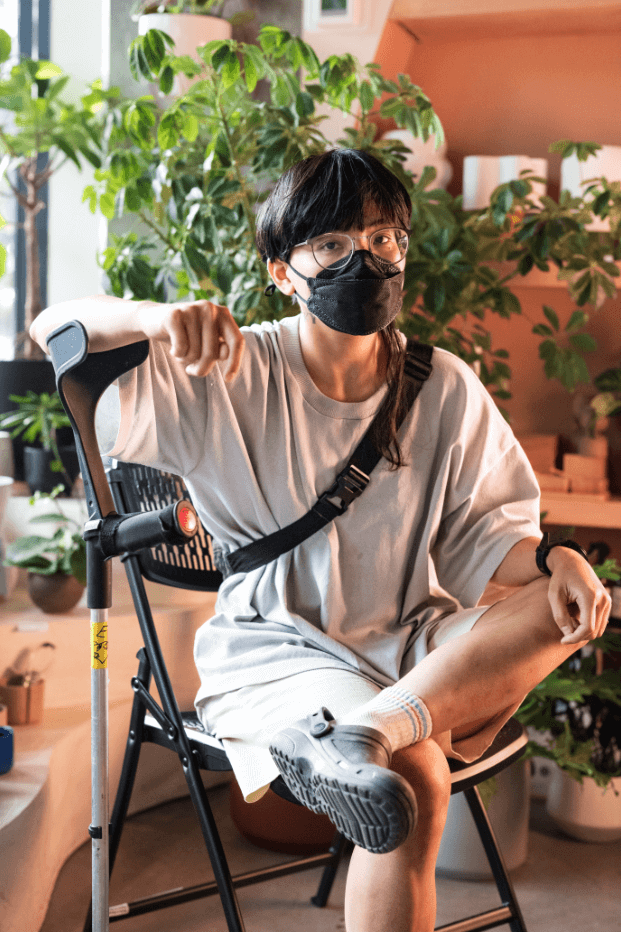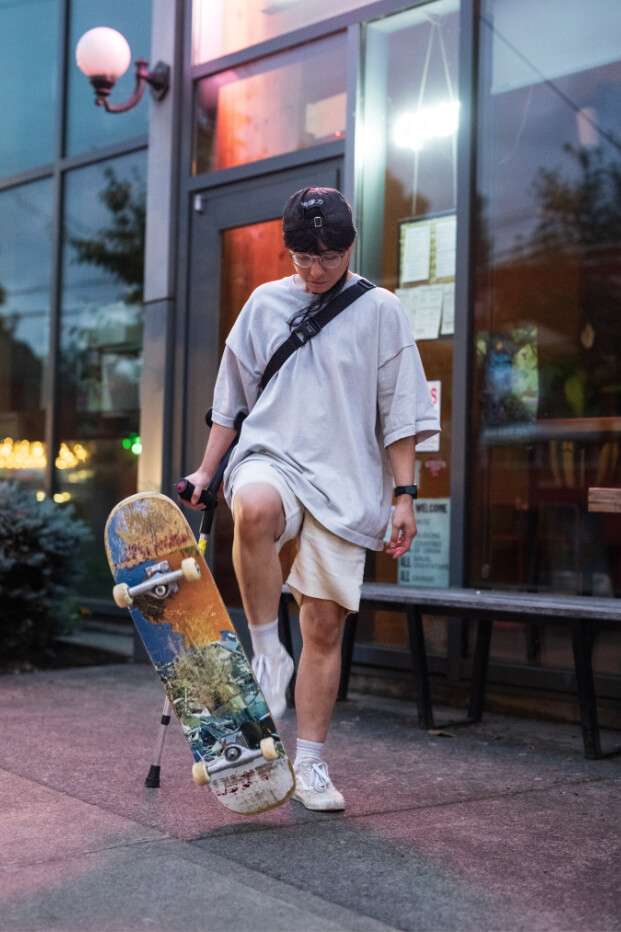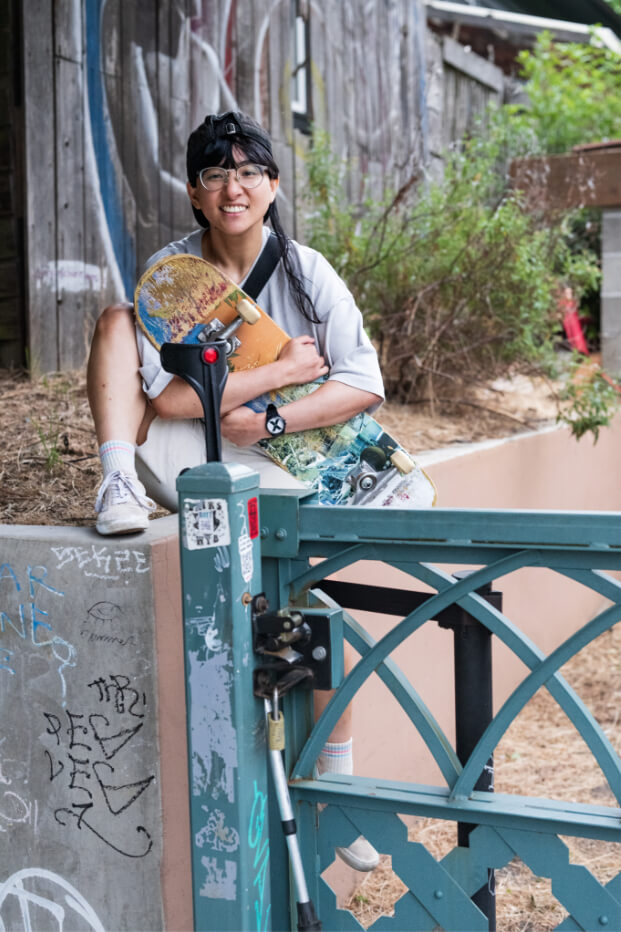November 6, 2025
Disabled And Here: Interview with LP
Hi! How would you like to introduce yourself? I’m Lani, but you can call me LP. Pronouns are he/him. I’m a nonbinary Filipino kid who likes skateboarding, creative nonfiction, and DIY music. I was born and raised in Hawai’i, moved to Portland for college, and eventually ended up staying and doing community organizing with Anakbayan East Portland, a grassroots Filipino youth organization fighting for national liberation and genuine democracy for the Philippines.

How did you get involved with community organizing? In my sophomore year of college, during the height of the fight against the Dakota Access Pipeline, I wanted to know what my role was as a Filipino to support Indigenous people’s struggles. This is how I learned about the Lumad people. They’re indigenous to the Southern Philippines, and they’ve had an ongoing struggle for their ancestral land against U.S. multinational corporations for decades. I remember being in awe meeting other anti-imperialist Filipinos in Portland who were agitated and calling for an end to U.S. military aid to the Philippines that funds extrajudicial killings. I remember thinking wow, Filipinos aren’t just apolitical.
That’s how I joined what we call the National Democratic movement of the Philippines. I helped found Anakbayan Portland in 2016, and we’re part of the overseas U.S. chapter of Anakbayan Philippines. It’s really exciting to see other chapters all over Canada, Europe, Australia, really wherever our people are forced to search for work and livelihood.
I’m 28, and Anakbayan is open to people between 13 and 35. That age gap is often surprising for people, but my struggles as a child of a migrant still impact me today — the cost of education, domestic violence, job insecurity, lack of LGBTQ education and resources. We expanded into another chapter, Anakbayan East Portland and that’s where I organize youth and their families.
We’re 5+ years into COVID, and I was curious about your perspective on things, as someone still dealing with Long COVID? I was diagnosed with Long COVID and POTS towards the end of 2023, and a lot of people remember me as “healthy” before then. I wasn’t. I have PTSD. I have an eating disorder. I’m on the spectrum. I still have post-concussion syndrome symptoms from a car accident years ago. Within the last year, I had an OCD diagnosis that I’m still trying to make sense of. I finally get why trans people have higher risks for Long COVID, because of all our other co-morbidities.
I was on full-time medical leave for five and a half months. I think the only reason I’ve been able to manage Long COVID was because I learned how to ask for help. And in order to ask for help, I had to see my symptoms as real. That was the biggest hurdle. My medical team included my PCP, acupuncturist, naturopath, physical therapist, occupational therapist, and mental health counselor. All of them actively reminded me that I knew my body best. I was able to get a POTS diagnosis within a couple weeks, whereas for others, it takes years.
Now, I’ve learned how to manage my chronic illness to where I am back at my job and starting to do Anakbayan work again. I have so much more patience with myself, and practice in asserting my needs to my family and friends.

Do you have any chronic illness hacks to share, particularly for skateboarding or writing? My disabilities have changed my mindset on what “good” skating is — skateboarding has no rules.
For skateboarding
- Find a warm up that works for you. I used to warm up by just pushing around and cruising, warming up my legs. Then I would start to do tricks or work on whatever I wanted. With POTS, I accidentally found doing this process backwards helped. When I do ollies and shuvits, I’m sitting, but still able to engage my core, hold my body up, pop my board, flick my foot — the same cardio, just not pushing and cruising. I do this long enough to break a sweat, and my body just feels so much better. Blood is circulating throughout my body, and next thing I know, I can stand on my board.
- Be around skateboarding, even if it’s just hanging at the sesh. My physical therapist told me that even just holding my board, sitting with the board underneath my feet, hearing the sound of the wheels against concrete, you’re strengthening the skating neural connections in your brain. You’re telling your brain, I do remember this part of my life, skateboarding isn’t over, the thing I associated with joy and community, that’s not gone.
- Make your own tricks. When I was still using my crutch daily, skating would be just me standing up and holding my board. That was it. That’s the trick. Because for weeks, I couldn’t even stand for a few minutes without collapsing. I had my groceries delivered, but couldn’t even carry them from the door to my kitchen table. Disability is making your life work for you and you defining the rules. Skateboarding isn’t all that different. Ironically, my ollies and shuvits are better now than before I used mobility aids. Who cares if I’m sitting down?
For writing
- Have a pen and paper everywhere. If I forgot my journal in the living room, I wasn’t able to stand up, walk 50 feet, and grab it without being out of breath.
- Respect your process. Some days, you can write by hand. Some days you need to type. I tried the speech-to-text feature / audio journaling, but I didn’t like it. I have aphasia so there are days where I can think, but just don’t know how to verbalize or write down my thoughts. I gave up trying to keep track of what I wrote and I’ve learned to adapt my process as a creative nonfiction writer.
You mentioned being an acoustic guitar player during our shoot. Are there any songs that you love to cover or just play? And what kind of DIY music do you do? I play guitar and bass, and I sing. I love playing and singing to some good boygenius, Clairo. (I’m a trans guy but my girlhood is so important to me.) Playing music is actually one of the most important ways I manage brain fog. It helps keep my brain active where I can engage in something that still requires attention and memory, but doesn’t require as many higher-level cognitive tasks.
Actually, during my medical leave, I ended up writing two songs, both lyricless and with a big post-rock feel. That helped express a lot of my grief towards my disability.
In terms of writing my own music, I think I would describe it as indie rock that heavily leans towards shoegaze and emo. Some friends and I are also in the process of making a hardcore band — I’ll let you know if that ever takes off.
How would you describe your fashion aesthetic? If I were to give it words, my fashion aesthetic right now is big shirt/big pants, he/him girl. I wear a lot of black and white because high-contrast colors look better on me. I also like to add a pop of color with accessories, like a red mask or the bright yellow Unity skate sticker on my forearm crutch. The few times when I do makeup, I’ll have bright color splotches on my face, as if a preschooler went ham during arts and craft time when the teacher wasn’t looking.
Recently, I was going to buy this 5-panel snapback. The shape of the hat made my head look more square (a more traditional masculine shape), but it didn’t feel right. One of my closest friends gave me some good advice and said 1) whatever I wear, it’ll be masculine just because of how I wear it. And 2) the masculinity that matters the most is the one where you’re comfortable, and that will come through in the look, regardless of shape.
As a participant in Disabled And Here’s T4T with Pride series, what does trans Pride mean to you? Going back to the whole thing about style, trans Pride means trusting yourself. I don’t think I would have been able to survive Long COVID if I didn’t believe my symptoms, see myself deserving of care, and trust that I am fully capable of asserting myself.
If it wasn’t for COVID, it would have been something else as tragic and devastating to make me realize that I have a whole life worth fighting for. I’m so lucky to have friends and comrades who have also taken my lessons so they can assert themselves in medical spaces, interpersonal relationships, with their employers. It’s humbling. This is the happiest and healthiest I’ve ever been in my entire life because I learned how to trust myself and my struggle. To me, T4T begins with yourself.

If you were able to choose a parallel world to live in, what would that place be like? I’d like to live in a world where my home country is free; my hands can dig into soil untouched from foreign mining companies; I could swim with no fear of drowning from U.S. marines or China’s military vessels. We could stop writing poems about mangoes and feeling lost because we have our land back, and we were the ones to do it. No American would trample on our land again, not without war.
Is there anything else that you’d like to share? I hope when you say Stop Asian Hate, you also include Filipinos, and you also say from Palestine to the Philippines, stop the U.S. war machine! Free Palestine means ending U.S. military aid everywhere — including the Philippines, the highest recipient of military and security aid in Southeast Asia.
Final question: What are the best ways to support you as well as your work?
- Read my creative non fiction writing at lanipaguio.medium.com.
- Support grassroots Filipino youth organizing. Nonprofit organizations have their place, but they are still limited in how radical and anti-imperialist they can be.
- Follow our work @ab.eastportland and @bayanoregon on Instagram.
- Venmo @ab-eastportland
This interview has been edited for clarity and length.